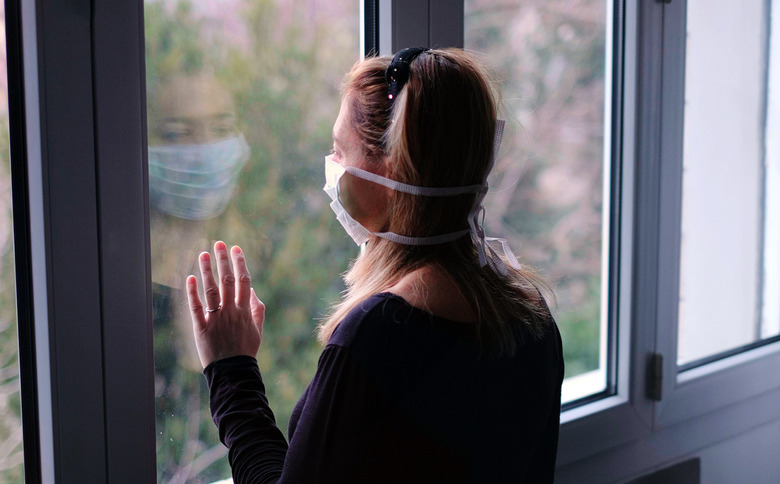Researchers Figured Out Why Coronavirus Kills People With No Other Medical Conditions
- A pair of new studies describe a key phenomenon that can occur in some patients infected with the novel coronavirus, and it could explain why the illness can kill younger patients with no preexisting conditions.
- The coronavirus can block interferon and delay the immune system's response to the pathogen. Some affected people might have undiagnosed interferon imbalances prior to the COVID-19 condition.
- These genetic interferon imbalances can exacerbate the effects of COVID-19 and cause complications that can lead to death.
People who suffer from certain medical conditions have a higher risk of developing COVID-19 complications, including death. The list of ailments that could worsen a COVID-19 prognosis includes cancer, heart disease, diabetes, and obesity. Older people are also more at risk of dying than younger patients. It's not just that some of the comorbidities mentioned above can develop later in life, but the immune response in older people might not be as effective as in young patients. Even so, there are plenty of exceptions to the rule. Many young patients have died from coronavirus infections, including people who had no serious chronic diseases. That's why there are no guarantees that younger, healthy adults and children will recover from a covid infection.
A pair of new studies provide a key observation that might impact future COVID-19 treatments. Studies we covered months ago said that the coronavirus blocks the production of interferon locally when it infects the first cells, potentially delaying the immune system's reaction to the new pathogen. Other studies proposed interferon-based therapies for COVID-19 as a result. But it turns out there may be another reason that impacts interferon production that has nothing to do with the presence of the novel coronavirus in the system.
♦ DEAL BREAK ♦
Amazon's hottest deals of the day include an extremely rare discount on Lysol wipes, crazy early Prime Day deals, Purell at the lowest prices on the internet, $30 off AirPods Pro and AirPods 2, black face masks for 30¢ each, and more!
Researchers from the Netherlands published a study in JAMA Network that detailed just four COVID-19 cases, which might seem unusual for any research into the novel coronavirus. But the scientists focused on only two pairs of brothers because of the COVID-19 complications they had developed.
The first two brothers were aged 29 and 31 years old. Both were healthy and did not suffer from any preexisting chronic conditions before catching covid. Within days after getting the virus, they were having trouble breathing on their own and they were admitted to the hospital. The younger man died and his brother spent 33 days in the hospital, including 10 days on a ventilator.
Two weeks later, two other brothers who were even younger developed respiratory failures as well. They were just 21 and 23 years old.
That's when doctors decided to study their genomes, thinking that a genetic cause might explain their predisposition to developing coronavirus complications following an infection. What the researchers found was that mutations carried on the X chromosome led to an interferon imbalance, which may have made them more susceptible to COVID-19 complications. Of note, the mutation is more likely to impact men than women.
The SARS-CoV-2 virus can block interferon and delay the immune response. But if the host already has an interferon deficiency problem caused by a previously unknown genetic issue, then the risk of complications is even greater.
The mutation observed in the Netherlands impacts 1 in 10,000 people, explains Bloomberg. It therefore cannot explain all severe COVID-19 cases that occur. But interferon deficiency could make it harder for some groups of people to fight the illness, even if they're in otherwise perfect health.
A second study published last week in Science comes from a global team of researchers and details another interferon issue that can lead to severe cases of COVID-19.
Some people make interferon antibodies on their own, which would impact the immune response against any pathogen, not just the novel coronavirus. Researchers looked for interferon antibodies in 987 patients who developed severe COVID-19 and found that 101 of them developed the antibodies that blocked the protein. Ninety-five of them were men. The scientists also looked at 663 people who developed asymptomatic or mild cases of COVID-19, and none of them had interferon-targeting antibodies. The scientists also found that patients over the age of 65 were more likely to develop interferon antibodies.
This is an autoimmune condition where the body attacks itself. The condition causes no symptoms and only comes to light following an infection with a virus like the novel coronavirus.
"These findings provide a first explanation for the excess of men among patients with life-threatening Covid-19 and the increase in risk with age," lead researchers Jean-Laurent Casanova told Bloomberg. "They also provide a means of identifying individuals at risk of developing life-threatening Covid-19."
Whether it's an autoimmune problem that leads to interferon imbalance or a rare genetic mutation, these are factors that can impact the course of COVID-19 and favor complications. Treatment with interferon might mitigate these silent medical conditions that might be unknown to affected people.
The Dutch researchers think that timing "may be essential" for interferon treatment. "It's only in the very early phase one can battle the virus particles and defend against infection," Alexander Hoischen told Bloomberg, adding that interferon might be more effective early in the illness than in the later stages. As Bloomberg points out, dozens of interferon treatment therapies are recruiting COVID-19 patients, and we'll have more answers in the future.
